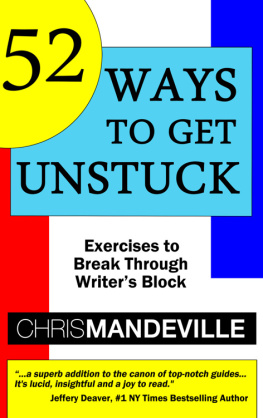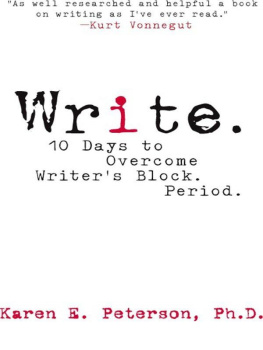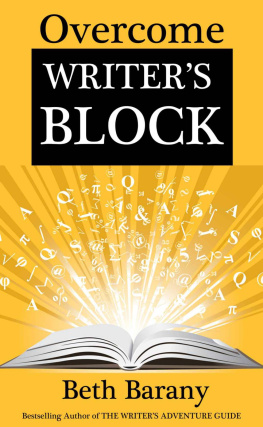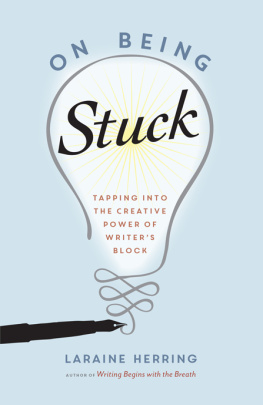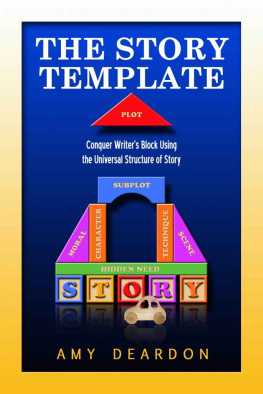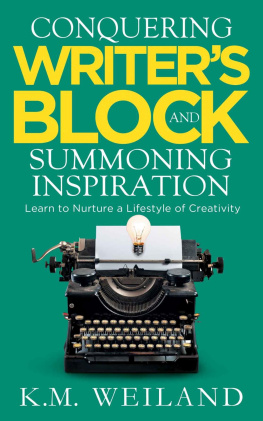Dear Writer, Are You In Writers Block?
Know the Signs, Identify the Source, Get Unstuck
Becca Syme
Copyright 2020 by Becca Syme. Published by Hummingbird Books in Bozeman, Montana.
All rights reserved.
No part of this book may be reproduced in any form or by any electronic or mechanical means, including information storage and retrieval systems, without written permission from the author, except for the use of brief quotations in a book review.
The author of this book does not dispense medical advice or prescribe the use of any technique as a form of treatment, nor is this book a diagnostic tool. This book is meant for informational purposes only and is not a substitute for therapy (psychological or physical). Please consult with a licensed physician or therapist for medical advice.
In many instances, the authors named inside are meant to represent conglomerate experience, except when named for a specific case study. Client names have been changed to protect anonymity, except when specific permission has been given by the author for use of their information in print.
The trademarked terms CliftonStrengths and Strengths (along with the CliftonStrengths assessment and the themes of Strength are the property of Gallup, Inc., and use of the terms does not constitute endorsement by Gallup, Inc. or any affiliated coaches or persons. Being a Gallup-Certified CliftonStrengths Coach does not equate to employment with or endorsement by Gallup, Inc, or any of its affiliates.
Contents
For everyone whos ever been told theres no such thing as writers block. You are not alone.
I live in the fastest growing micropolois in the country, according to the US Census Bureau. Thirty years ago, my neighborhood didnt exist, and my house was in the middle of a wagon trail.
You can still see the trail, on the other side of the neighborhood, where there will soon be houses instead of fields.
Of course, living in a growing city has its upsides. Not many towns of our size have a big international airport with direct flights to most major cities or a major medical center or a Costco. Theres a reason they call us Bozeangeles.
But there are downsides, too. Like the constant road construction. My side of town has had every major intersection under some form of construction for more than a year.
Many of the locals are unhappy with the growing pains. They might not mind the Costco, but they hate the traffic and the little annoyances. They put passive aggressive bumper stickers on their dirty vehicles that say things like, Did You Move Here To Be In A Hurry?
To which I want to say um, what if the answer is yes, Roger? Because it might be.
That gut-check of why did you move here only works if the real answer is, youre right, Roger, I should slow down . Otherwise it does nothing.
Why matters.
For my part, Ill gladly leave ten minutes early for appointments if it means we might get a Trader Joes someday.
Thats how I see it in my head. The road construction is worth it. The why is the payoff.
But for me, even as a writing coach, the why is always the payoff. Im fairly obsessed with why .
Ive been coaching in some form for more than fourteen years, and specifically in my job as a coach-of-writers, Ive coached thousands of writers, individually (one-on-one). I call myself a success coach because I am specifically interested in studying the alignment of what makes people successful. Thats the why . Im just as interested in my never-written-a-book clients as I am in my seven-figure-author clients because everyone has a why . Not the motivation that makes them do what they do. More like a reason why. A cause-and-effect why. Their particular path to success. Thats what interests me the most. Studying what successful paths have in common. Ive done it at the Masters level, and on the individual level. This whole topic of success is my obsession, because there is nowhere that the reason / why / cause matters more than in determining how success happens.
In the introduction to my YouTube channel, I say, anyone can tell you what worked for them, and they can say it might not work for you, but they cant tell you why. I can tell you why.
And I dont take it lightly to say that.
There is a why behind everything. And not just in a big-picture-what-motivates-you kind of way (although that is often the case, as well). In a cause-effect way, as well, and thats what I deal with the most. Why did something happen, and how can we use that why to fix the problem.
There was a writer named Carla who had been referred to me because shed been struggling in the middle of her book for weeks and I could practically see the writers block on her face. She looked stoppered, like a bottle of corked champagne.
But when I mentioned the phrase writers block, she got frustrated. Its not writers block, she said. My writing coach says theres no such thing.
Knowing that sometimes, saying Voldemort puts people on edge, I tried a different tactic.
What does it feel like inside your brain when you try to write the words? I asked.
I feel she paused, I dont know. Its not a feeling. Its like I cant see my way forward. I just dont know what happens.
Having been in that exact place myself and made peace with this phrase we seem to hate, I couldnt help myself asking, And why isnt that writers block?
Because writers block doesnt exist. My writing coach says its just something writers invent to blame when they dont want to do eat the frog.
Having heard that phrase before, I knew what she was referring to. The idea that writers who didnt continue writing were basically allowing their fear of the manuscript (fear of failure/success) to stop them writing, and all they needed to do was just sit down and force themselves to write the words.
Of course, knowing what I know about the human brain, I have a pretty major problem with that logic, but well get to that in a minute. Back to Carla.
And have you tried sitting down and making yourself write the words?
Every day for weeks.
And what happens when you do?
I struggle with every word.
I paused and reflected some of the language shed used about not being able to see what happened next. I ended with, What would you normally do, during this time period, if you werent trying to force yourself to get words on the page?
Her face crumpled, and I thought she might cry. But having seen this happen before, I knew it wasnt sadness. It was relief. She hadnt even spoken the words out loud yet, but just the thought of being able to stop all this painful writing and go think about what she wanted to write next brought so much emotion into her eyes, it was visible. Just. The. Thought.
She said, Id just go think about it until I figured out what was wrong.
Then do that, I said.
So she did. I got an email from her a week later and she had finished the book.
After weeks of trying to force herself to write when she couldnt, a little bit of thinking, and she was well on her way.
If shed just acknowledged she was blocked and faced it, she would have been on her way to writing weeks before she saw me. But the refusal of another writer to admit (even in the face of evidence to the contrary) that something was legitimately blocking her, even though she clearly wanted to write, had her more blocked than she needed to be.



